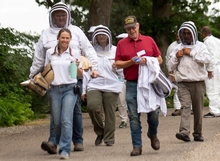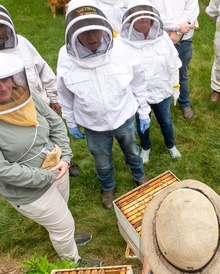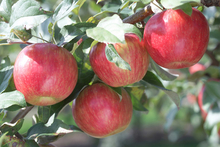Jim Rowe was just shy of 70 years old when he retired from his career with the University of Minnesota. He enjoyed his work so much that he recently came back to the U — as a participant in a University of Minnesota Extension program — to attend a beekeeping field day near his home in Owatonna.
A proud Vietnam veteran, Rowe served in the U.S. Air Force from 1964 to 1968. He was in Vietnam for the last two years. He is one of many U.S. military veterans to take an interest in beekeeping. Extension’s Bee Squad even offers free Bee Veterans courses.
Rowe was the assistant director of operations and plant science research manager at the U’s Rosemount Research and Outreach Center, responsible for the day-to-day operations on 4,700 acres. While Rowe was not responsible for the honey bee hives there, he did work on a couple of related projects.
Rowe is now in his third year rearing two honey bee hives. While many veterans become interested in bees as a form of therapy, Rowe came to beekeeping through growing apples. Naturally, as a member of the University of Minnesota community, he chose Honeycrisp.
“I have 22 Honeycrisp apple trees from Bachman's that I planted about 10 years ago,” says Rowe. “I was getting a lot of blossoms but not many apples, so next project, try honey bees.”
Honey bees pollinate the majority of U.S. apple crops.
Two years ago, Rowe harvested 7 ½ gallons of honey, and last year he harvested 7 gallons. As he prepares to separate the honey from his hive frames this year, he’s hoping for about the same amount.
“I also had a huge crop of beautiful Honeycrisp apples,” he says.
Honey bees face multiple challenges to their health. Minnesota’s cold climate is another reason that the Beekeeping in Northern Climates course, developed by renowned University of Minnesota researcher and Extension specialist Marla Spivak, is one of Extension’s longest-running courses.
The lifelong learner hopes the field days are offered again next year.
“The longer I have bees, the more I learn how little I know about raising them,” says Rowe. “The best method of learning is seeing what successful beekeepers are doing.”




